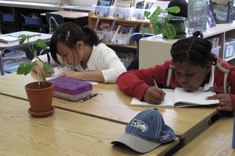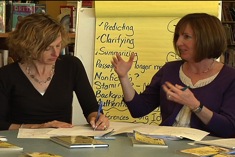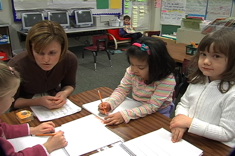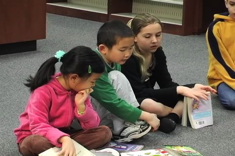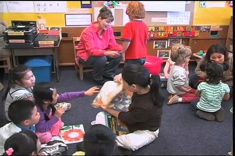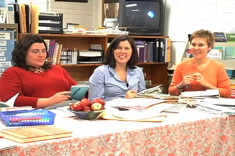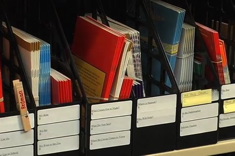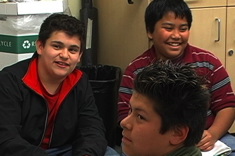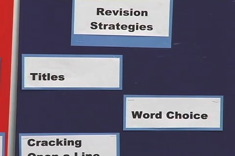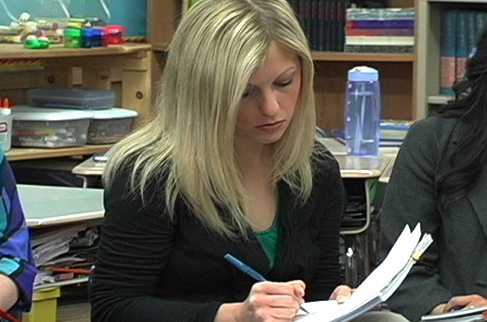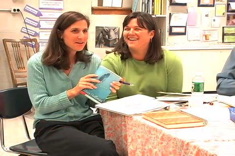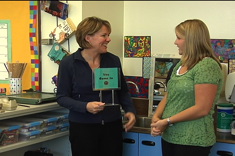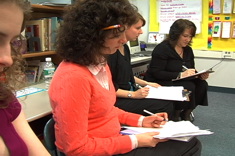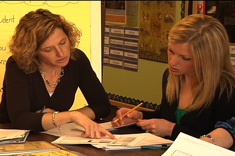Articles
Here is where you’ll find all the latest print features from our contributors. If you’d like to browse specifically by grade level, topic, or contributor, you can use the links in the right sidebar.
Latest Content
Recipe for a Literary Tea
Ruth Shagoury has a recipe for you – a soothing “literary tea” with connections to favorite authors. You can start from her recipe to concoct your own author-themed tea, and we also include links to resources on the web for purchasing the loose tea ingredients.
Rethinking Writing Centers – Winter Follow-Up
Shari Frost questioned the amount of writing going on in many elementary writing centers. She decided to work with a team of literacy coaches and teachers to explore ways to increase writing in classrooms – through better use of centers, or alternative programs. In this follow-up article, Shari presents two different solutions that are working well – one involves introducing writing tools in a more systematic way in centers, and the other is an implementation of a different program entirely for independent work.
Fostering More Curricular Collaboration in Teams: The Meeting Notes Form (TEMPLATE)
Katie Doherty faces daunting challenges as a grade-level team leader in her middle school. A simple notetaking form works wonders in elevating the conversations and collaboration.
Sales Clerks and Literacy Leaders
Franki Sibberson reflects on what makes a perfect salesperson . . .and literacy coach.
Assessing Spelling in Writing Workshops Part 1: Thinking Through the Assessment
Katie DiCesare takes on the challenge of developing a one-page assessment tool to analyze the spelling needs and abilities of each of her 1st graders. This is the first in a series, as Katie takes us through the use of the tool in her workshop.
Nonfiction Books for Independent Reading: Moving Beyond Content Connections (BOOKLIST)
Franki Sibberson explains how she boosted the amount of nonfiction texts her grades 4 and 5 students were choosing for independent reading by focusing more on interest than on content connections.
Warm It Up: Lighting a Classroom for Literacy (PHOTO ESSAY)
Here are a few suggestions and quick tips for a lighting redesign from The Sisters (Joan Moser and Gail Boushey).
Beyond Matt Christopher (BOOKLIST)
Franki Sibberson finds many boys who are reluctant readers love the sports novels of Matt Christopher. So what is the logical next author or genre for these boys to keep them reading voraciously?
Watching Teachers Teach: An Observation Form for Literacy Coaches
Being genuine about feedback is essential to educators. Jan Miller Burkins finds a form and process that allows her to be both thoughtful and specific.
Open Book Clubs
Shari Frost shares the nuts and bolts of setting up open book clubs in your school. These clubs are a great way to expand the reading community, as well as connect school libraries and classrooms.
Multicultural Picture Books for Young Children
These books do double duty – building community and understanding of the sounds of language.
Letting Go and Holding On: Evaluating Our Work as Literacy Coaches
It’s hard to know where we’re going if we don’t know where we’ve come from. Jan Miller Burkins has developed an evaluation form for literacy coaches to give to teachers.
New Teacher Conversations: Management Stories from the Classroom
Ruth Shagoury provides a workshop model for teacher leaders looking to encourage respectful conversation with new teachers on the topics that are near and dear to them.
Quotes about Literacy Leadership and Change
Quotes to inspire teachers who lead.
Giving New Readers a Diet of More Than Leveled Books
Franki Sibberson contemplates which diet plan she’ll try this month, and that leads her to think about what a steady “diet” of leveled books does for young readers.
Chance Encounter
Jennifer Jones ventured out to lunch with some former colleagues, and came home with a new perspective on the impact of her teaching after a chance encounter with YuYang, a former student.
The Language of Coaching Part I: Word Choices
If you believe it’s challenging but “possible to be tactful without being inauthentic,” Jan Miller Burkins will guide you around the thorniness of the language of coaching.
Favorite Mentoring Quotes
If you're guiding the learning of others, you'll be inspired by these quotes.
Notetaking Series Part V: Getting Out of Notetaking Ruts
It's a quick journey from notetaking routines to notetaking ruts. This installment of the notetaking series focuses on ways to get out of the ruts that emerge naturally whenever any notetaking routine is established.
Memorable Students, Memorable Teachers: A Quick-Write Icebreaker for Teacher Workshops
This is a quick-write workshop activity that is especially suited to the more relaxed pace of summer professional development workshops, or first meetings with colleagues in the fall when everyone is refreshed and reflective.
How Study Groups Are Like Self-Cleaning Ovens
With a few key elements in place, Brenda Power and Jennifer Allen explain how study groups can almost run themselves and get everyone involved.
Punctuation Quotes
Fun quotes to start discussions about punctuation for learners of any age.
“Hard” Reading Workshop: Understanding How Proficient Readers Comprehend Difficult Text
The Hard Reading Workshop is a terrific professional development activity for launching conversations about text difficulty and strategy instruction.
Literacy Coaching Interview Rubric
This rubric can help anyone interviewing for a literacy coaching position determine if there is a philosophical fit between their beliefs and the goals of the school. The rubric is also helpful for any school in the process of defining responsibilities for literacy coaches
The Language of Coaching Part II: The Leading Edge
Jan Miller-Burkins explores the “how” of shifting language so that it is less judgemental in discussions with colleagues.
Notetaking Strategies Part I: “In the Midst” and “After the Fact” Notes
There is a difference between “in the midst” and “after the fact” notes, and different methods might work better in different observation contexts once you know your options.
New Teacher Conversations: Breaking Through Roadblocks and Sustaining Support
The roadblocks activity can easily be adapted for study groups looking at almost any topic.
Mentor Interviews — A Protocol of Questions
This series of over 30 questions for mentors or novice teachers can be used to plan a mentoring program, match mentors and novice teachers, or launch partnerships early in the fall.
Poets on Notebooks Quote Collection
Whether you love to read, write or teach poetry, these quotes will give you something to think about and inspire you.
On Board with Literacy Leadership
Wisconsin literacy coaches Jennifer Jones and Charity Meyer were inspired by Jennifer Allen’s “Literacy Room” to try out “Literacy News” resource boards in their schools. They provide helpful tips for starting these boards in your school, as a way to give continuous and timely support to teachers at any level.
Browse Content By
Type
Category
- Assessment Tools
- Big Fresh Archives
- Booklists
- Choice Numeracy
- Classroom Design
- Common Core
- Community Building
- Conferring
- Content Literacy
- Digital Literacy
- English Language Learners
- Equity
- Family Relations
- Free Samples
- Guiding Groups
- Leadership
- Literacy Coaches
- Mentor Texts
- Minilessons
- New Teacher Mentors
- Podcasts
- Poetry
- Quote Collections
- Reading Strategies
- Self Care
- Struggling and Striving Learners
- Talking and Listening
- Teacher Study Groups
- Teaching Reading
- Teaching Writing
- Word Study and Vocabulary
Author
- Melissa Quimby
- Nawal Qarooni
- Gwen Blumberg
- Julie Cox
- The Lead Learners
- Hannah Tills
- Josie Stewart
- Ruth Metcalfe
- Mallory Messenger
- Becca Burk
- Jodie Bailey
- Vivian Chen
- Mary Brower
- Tiffany Abbott Fuller
- Stephanie Affinito
- Ruth Ayres
- Leigh Anne Eck
- Heather Fisher
- Shari Frost
- Julie Johnson
- Suzy Kaback
- Gigi McAllister
- Shirl McPhillips
- Melanie Meehan
- Cathy Mere
- Debbie Miller
- Tara Barnett and Kate Mills
- Tammy Mulligan
- Dana Murphy
- Bitsy Parks
- David Pittman
- Brenda Power
- Heather Rader
- Matt Renwick
- Mandy Robek
- Christy Rush-Levine
- Gretchen Schroeder
- Jen Schwanke
- Brian Sepe
- Katherine Sokolowski
- Stella Villalba
- Jennifer Vincent
Grade Level
Choice Literacy Membership
Articles
Get full access to all Choice Literacy article content
Videos
Get full access to all Choice Literacy video content
Courses
Access Choice Literacy course curriculum and training


